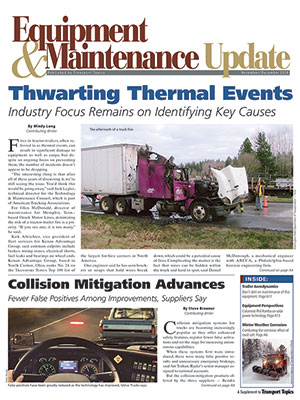Investigating Thermal Event Causes Is Crucial, Experts Say
No fleet or truck driver wants to experience a thermal event, but if a fire occurs, those in the industry said it is crucial to find out why it happened.
Doing a thorough follow-up investigation for every thermal event typically will lead to the source of the fire.
“You may not get it the first time around, but if you’re doing it repetitively, you’re going to see a trend,” said Kirk Altrichter, vice president of fleet services for Ohio-based Kenan Advantage Group.
Lee Long, director of fleet services for Lexington, S.C.-based Southeastern Freight Lines, said it is essential to look at the cause of the fire rather than the effect.

Wheel bearings can melt under very high temperatures. (Accuride Corp.)
“When you’re looking at something that was burnt, it is hard to determine the origin of the fire,” Long said. “You have to look at the patterns of the fire, the source, the burn pattern of the incident and make a determination of what was the source or the origin of a fire.”
Daniel McDonough, a mechanical engineer with ARCCA, a forensic engineering firm based in Philadelphia, said the first step in investigating a fire is to find the general point of origin.
“With trucks, there are generally a few areas where the fire can be — the engine compartment, the cab or the drive axle,” he said. “Once you identify the area, then you look at the potential ignition source in that area.”
On a trailer, the primary areas that create heat are the brakes and wheel bearings, McDonough said.
After something catches fire and burns, it can be difficult to determine a cause, said Winston Minchew, maintenance training manager for Old Dominion Freight Line Inc., based in Thomasville, N.C.

- Collision Mitigation Advances
- Thwarting Thermal Events
- Here Comes the Sun
- The Analytical Dilemma
- Preventive Maintenance Helps Stop Rust Due to Road Salt
- Investigating Thermal Event Causes Is Crucial, Experts Say
- Tire Monitoring and Inflation Systems Can Lead to Fuel Savings, Longer Tire Life
- Seeking Alternative Solutions to Salt
- Don't Skirt Proper Maintenance on Trailer Aero Devices, Experts Say
Jack Legler, technical director for American Trucking Associations’ Technology & Maintenance Council, agreed.
“How do you go to an event that is air- or tire-related and go in deeper to see what happened? That seems to be the challenge we still have,” he said.
During an investigation, it is important to avoid jumping to conclusions, Long said.
“Collect the data, inspect vehicles and put a plan of action in place to correct the issue you’re seeing,” he said.
Southeastern Freight Lines interviews drivers and vendors that make the repairs and looks at telematics information to see what happened before the thermal event.
Greg Sturdy, director of wheel-end product engineering for Accuride Corp. and secretary of TMC’s chassis and brake study group, said many fleets are reluctant to discuss thermal events. He encouraged fleets to investigate incidents right away and call in component manufacturers if they have concerns.
“It is critical we get as much information as possible as quickly as possible before the information is sullied,” Sturdy said, adding that it is helpful for fleets to share information with TMC.
Typically, insurance companies want to get to the cause to determine liability, McDonough said. However, it also is essential to find the reason so if it is a maintenance issue, it can be addressed.
“If it is a product issue, such as the same type of bearings fail consistently,” McDonough said, “then it is important to take that information to the manufacturers so they can improve.”

